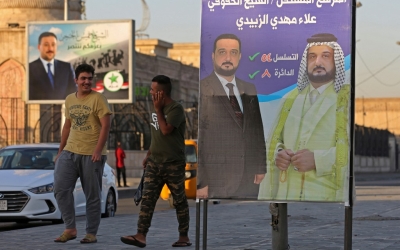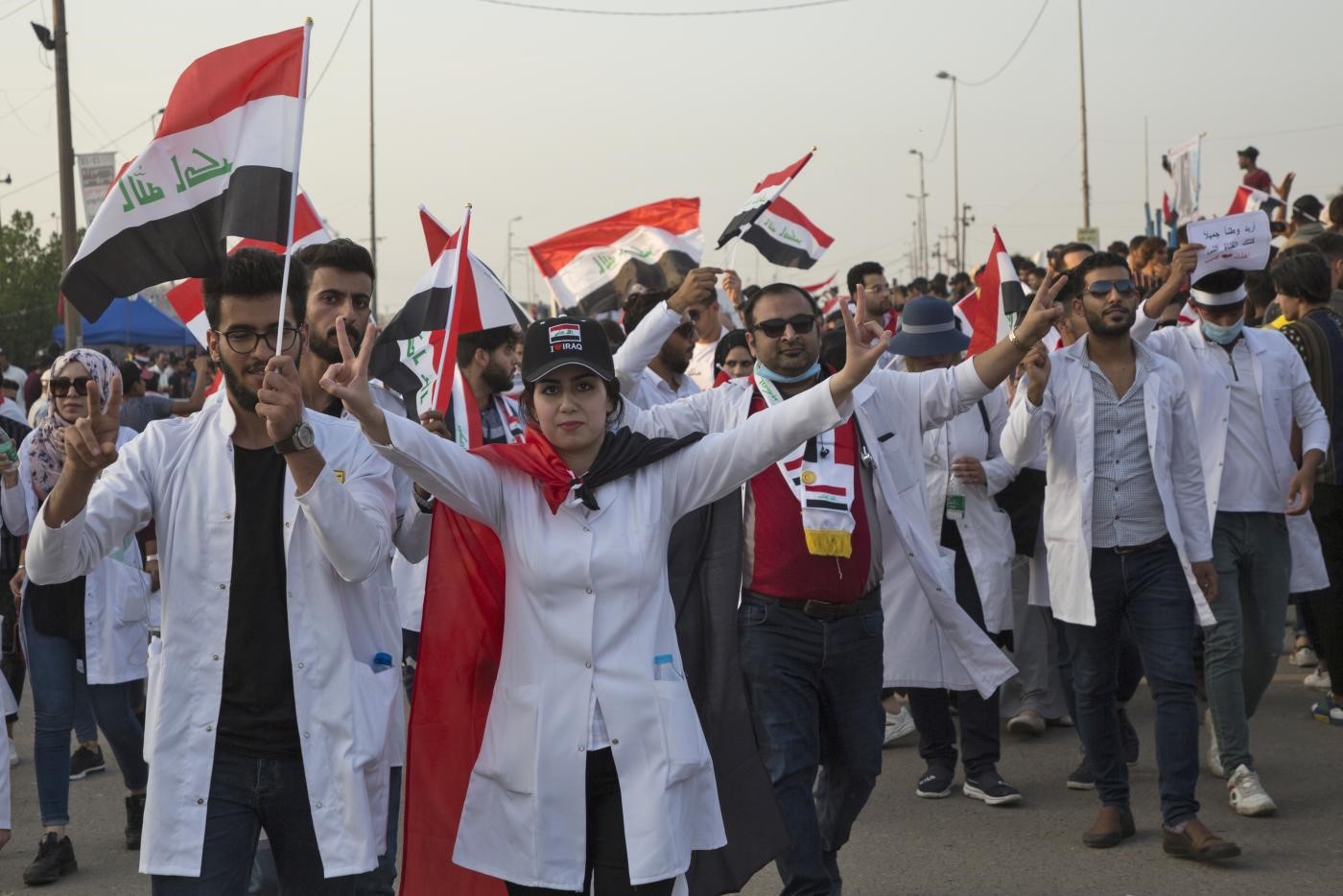Why the Iraq elections will not prevent the next political crisis

On Sunday, Iraq is going to hold its first early election since the introduction of electoral politics to the country after the US-led war that toppled Saddam Hussein in 2003.
Iraq's ruling elite needs the election to maintain political legitimacy and secure access to oil rent through power-sharing agreements
The election came as a response to the large wave of protests in Baghdad and the southern cities in 2019, which forced former prime minister Adel Abdul Mahdi to resign. Shortly afterwards, the parliament voted to change the electoral law, and the dominant parties promised an early election as a way out of the crisis.
As time passed, most demonstrators left the streets due to a combination of repression, co-option, Covid-19 restrictions and fatigue. Dominant parties felt no pressure to make additional concessions and sought to ensure that changes introduced to the electoral system will benefit rather than harm them.
A transactional process
The new electoral system is based on the non-transferable vote and direct choice of candidates in smaller districts in each governorate. Boundaries of electoral districts were designed through a transactional process between major parties in parliament.
Stay informed with MEE's newsletters
Sign up to get the latest alerts, insights and analysis, starting with Turkey Unpacked
The law was introduced enthusiastically by the Sadrist bloc which saw it beneficial to its political chances. It was also supported by some activists who thought it would be an effective tool to weaken the dominant parties and reduce the influence of traditional party leaders.
However, as proven in other countries, the new system functions in favour of large, organised, and well-funded parties that can field a large number of candidates and help finance their campaigns. Additionally, dominant political parties enjoy other advantages such as controlling armed wings that can be used to intimidate competitors, and enjoying access to state resources and immunity from judicial questioning.
Although a group of independent judges was selected to serve in the electoral commission, the Iraqi judiciary proved vulnerable to political pressure. Thus, the actual mandate of the new election commissioners was limited to technical and procedural aspects.
Red lines
Undeniably, there has been a considerable improvement in the technical preparations and procedures aimed at preventing fraud and irregularities. Yet, when it comes to the more substantial measures that could secure a fair competition, the election commission could not go beyond the red lines drawn by dominant parties.
One activist told me that if election results contributed to strengthening moderate groups he would consider this a step in the right direction
None of these parties was disqualified because of their obvious connection to armed groups (which is constitutionally forbidden but, if implemented, would practically mean banning all major parties). Nor was there any effort to enforce transparency in the dominant parties’ fundraising activities.
Additionally, a campaign of assassinations and intimidation targeting activists and would-be candidates, forcing many others to flee their hometown in search of safety, has been going on for months. Armed groups linked to some of the dominant parties are said to be implicated in this campaign.
Under such circumstances, several activist groups decided to boycott the election, citing the lack of proper conditions and fair competition with established parties. But this decision also reflected a division among activists between maximalist groups that seek to drastically overhaul the system and hence don’t trust an electoral process designed by established parties, and gradualists who think there is room for a limited alteration in the balance of power that requires active participation in the election by voters from dissatisfied segments of society.
One of those activists told me that if the election results contributed to strengthening moderate groups within the ruling elite, as opposed to those that have armed wings, he will consider this a step in the right direction.
Better conditions
The election is supervised by a government whose prime minister stated his neutrality among contenders and with a bigger international involvement than the last election. Thus, it would take place under better technical and procedural conditions than the previous vote, and this may be translated into a larger number of independents and small parties in parliament, especially if the turnout is higher than last time.
However, such an outcome is unlikely to result in a large-scale transformation, especially given that independent candidates and small parties are not united by a single agenda. Some of them are thought to be linked to political parties; others are representatives of tribal communities seeking access to power and state resources and willing to ally with whoever offers the highest bid.
What is clear, however, is that more independent candidates and small parties in parliament would mean a longer and more complicated bargaining process after the election.
In this context, the election must be seen less as an effort to reform the system and more as an attempt to re-legitimise it after it was seriously damaged by the explosion of anger seen in the 2019 protests.
Weak institutions and rule of law, institutionalised patronage, and extrajudicial violence continue to shape the status quo, rendering the election a tool of political manoeuvring rather than a path towards meaningful change.
None of the dominant parties is inherently democratic or a firm believer in the constitution or rule of law. Yet, they need the election to maintain political legitimacy and secure access to oil rents through power-sharing agreements.
In this sense, the election result will be accepted only if it does not strongly threaten the fragile balance of power in a country where there are several powerful armed groups operating independently of the state, extracting resources from the state, and contesting the state’s monopoly of "legitimate coercion" when necessary.
The status quo is not shaped by an authoritarian government but by multiple authoritarian actors who participate in elections because none of them can afford to stay out of the game or let others control it.
The early election, based on a new electoral system, was initially a concession offered by the elite under the pressure of the protest movement. But when this movement lost momentum and stopped being a serious threat, the elite felt no urge to make further concessions. Therefore, it's not going to change the status quo, but it may well lay the ground for the next crisis.
The views expressed in this article belong to the author and do not necessarily reflect the editorial policy of Middle East Eye.
Middle East Eye delivers independent and unrivalled coverage and analysis of the Middle East, North Africa and beyond. To learn more about republishing this content and the associated fees, please fill out this form. More about MEE can be found here.








